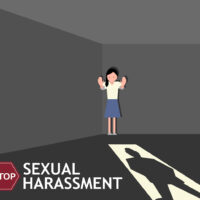Employee Forced To Quit Due To Hostile Work Environment Sexual Harassment EEOC Lawsuit Alleges

In a press release issued on September 30, 2020, the U.S. Equal Employment Opportunity Commission (EEOC) announced that it has filed a sexual harassment lawsuit against Hannah’s, Inc., d/b/a Hannah the Pet Society (Hannah). On September 29, 2020, the EEOC filed the case, U.S. Equal Employment Opportunity Commission v. Hannah’s, Inc., d/b/a Hannah the Pet Society, Case No. 3:20-cv-01688, in the U.S. District Court for the District of Oregon after initially attempting to resolve the case through conciliation efforts. Conciliation efforts having failed, the EEOC moved forward with attempting to correct the alleged unlawful employment practices through litigation.
The EEOC has filed the sexual harassment lawsuit pursuant to Title VII of the Civil Rights Act of 1964 (Title VII) on behalf of a former employee of Hannah, Amber Willett (Willett). Title VII prohibits employers from discriminating against employees on the basis of sex. Sexual harassment is a form of sex discrimination forbidden by Title VII. The EEOC contends that Hannah subjected Willett to an unlawful hostile work environment because of her sex (female). The EEOC further contends that Willett was involuntarily forced to resign in order to escape the hostile work environment. In this article, our Citrus County, Florida hostile work environment lawyers explain the EEOC’s allegations against Hannah.
Employee Quits To Escape Hostile Environment
From November 27, 2017 until June 2, 2018, Willett was employed as a Pet Nurse at Hannah’s facility in Tigard, Oregon. Throughout her employment, the EEOC maintains, Willett was subjected to unwanted harassing behavior because of her sex by Hannah’s Chief of Staff. The Chief of Staff’s unwelcome verbal conduct of a sexual nature towards Willett included sexual remarks, such as asking her what sounds come from her bedroom when her boyfriend was over and telling her that she did not need to wear a bra because she had “nothing there.” The Chief of Staff also asked Willett’s roommate and direct supervisor, the Director of Nursing, to record the sounds coming from Willett’s bedroom when her boyfriend was over. The EEOC further alleges that the Chief of Staff made “on-going, unwelcome comments denigrating to women,” such as “shut up woman” and “stupid woman.”
In December 2017, according to the EEOC, Willett complained to her immediate supervisor about the Chief of Staff’s unwanted sexual harassment. However, her supervisor had been complaining to management since 2016 about the Chief of Staff’s on-going sexual harassment of female employees, and Hannah “failed to investigate or remedy the hostile work environment.” In January 2018, Willett confronted the Chief of Staff directly and objected to his sexual harassment. When the Chief of Staff continued to sexually harass Willett, she complained to Human Resources in April 2018.
Because the Chief of Staff’s sexual harassment continued despite her repeated complaints, Willett resigned her employment on June 2, 2018. The EEOC contends that in failing to take prompt and effective remedial action to protect Willett from the on-going sexual harassment despite having knowledge of the behavior, Hannah constructively discharged Willett in violation of Title VII by forcing her to resign in order to escape the intolerable hostile work environment.
Sexual Harassment Victims’ Rights
The EEOC is the administrative agency of the United States responsible for interpreting and enforcing federal civil rights laws protecting employees’ rights. As part of its mandate to eliminate discrimination in the workplace, the EEOC is authorized by federal law to bring lawsuits on behalf of employees who have been forced to work in a sexual hostile work environment. In a press release issued by the EEOC on September 30, 2020 regarding the case, the Director of the EEOC’s Seattle Field Office, Nancy Sienko, said, “employers take heed: prevention is the best tool to eliminate sexual harassment in the workplace, so train your managers and employees to recognize illegal behavior.” “Employers should send the message,” Ms. Sienko explained, “that no one in the organization is above the law and that sexual harassment absolutely will not be tolerated.”
Lecanto, FL Hostile Work Environment Lawyers
Based in Ocala, Florida and representing employees throughout Central Florida, our Citrus County, Florida hostile work environment attorneys have fought for the rights of sexual harassment victims for more than two decades. If an employer has required you to work in a sexually hostile work environment or you have been forced to quit because of sexual harassment in the workplace, please contact our office for a free consultation with our Lecanto, Florida hostile work environment lawyers. Our employee rights law firm takes hostile work environment cases on a contingency fee basis. This means that there are no attorney’s fees incurred unless there is a recovery and our attorney’s fees come solely from the monetary award that you recover.


 Close Menu
Close Menu